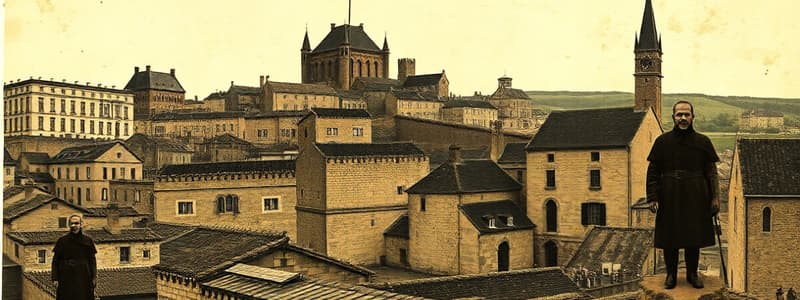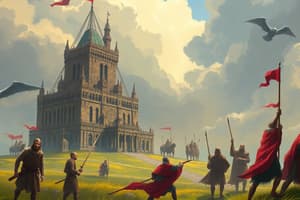Podcast
Questions and Answers
Which of the following best describes the Viking Age?
Which of the following best describes the Viking Age?
- AD 600 - 800
- AD 500 - 750
- AD 750 - 1050 (correct)
- AD 1050 - 1300
The Vikings were primarily known for their agricultural practices rather than their seafaring skills.
The Vikings were primarily known for their agricultural practices rather than their seafaring skills.
False (B)
What was the primary language spoken by the Vikings?
What was the primary language spoken by the Vikings?
Old Norse
Vikings often raided far-flung areas, including rivers of _____ and cities like Paris and London.
Vikings often raided far-flung areas, including rivers of _____ and cities like Paris and London.
Match the following Viking concepts with their meanings:
Match the following Viking concepts with their meanings:
What type of society did Vikings primarily have?
What type of society did Vikings primarily have?
Vikes were rarely involved in trade activities.
Vikes were rarely involved in trade activities.
What is one reason the Vikings' raids were often considered violent and brutal?
What is one reason the Vikings' raids were often considered violent and brutal?
Flashcards
Viking Age
Viking Age
A period from approximately AD 750 to 1050, characterized by Scandinavian seafaring raids and exploration.
Viking Raids
Viking Raids
Violent attacks by Vikings, often motivated by economic gain, and resulting in significant impact on Europe.
Viking Society
Viking Society
A structured society in Scandinavia, focused on family, farms, and hierarchical social structure.
Viking Worldview
Viking Worldview
Signup and view all the flashcards
Viking Sagas
Viking Sagas
Signup and view all the flashcards
Viking Exploration
Viking Exploration
Signup and view all the flashcards
Viking Influence
Viking Influence
Signup and view all the flashcards
Modern Misconceptions
Modern Misconceptions
Signup and view all the flashcards
Study Notes
Vikings
- Old Norse word for "bay people"
- Seafaring raiders from Scandinavia (Denmark, Norway, and Sweden)
- Voyaged extensively throughout Europe, Mediterranean, North Africa, Eastern Europe, Middle East, and North America
- Viking Age (ca. AD 750-1050)
- Expert sailors and navigators
- Established settlements and governments across the North Atlantic and Russia
- Spoke Old Norse, used runes for inscriptions
- Practiced Old Norse religion, later converted to Christianity
- Family and farm-oriented society
- Deep social stratification
- Slave trade
- Relatively equal standing between married men and women
- Extensive maritime violence, large fleets carrying thousands of men
- Crossed the Atlantic to Vinland
- Raids in British Isles and France, transitioned into continual presence
- Settlements in Greenland lasted nearly 400 years
- Sophisticated traditions, practice, and world views over millennia
- Vikings' actions were sometimes part of economic policy
- Improved standing through raiding (personal wealth and economic prospects)
- Popular conceptions of Vikings as violent barbarians or noble savages are sometimes inaccurate
- 19th-century portrayals often involve white supremacist stereotypes.
Viking Culture and Society
- Oral culture, limited written records (mostly Viking sagas).
- Primarily a source of archaeological findings and limited historical texts.
- Society structured around families and farms.
- Asker (ash tree) became the first man, Embla (elm tree) the first woman, created by three gods Oden, Vé, and Vili.
- Multi-cultural and multi-ethnic
- Hierarchical society (not a homogeneous group)
- Wane of the Roman Empire, interaction with Germanic tribes, and diaspora affected the Viking people
- Rise of piracy, sea pirates, and colonization of Russia and beyond.
- Urban revolution in Scandinavia: development of villages, trade, and mysticism.
- Multitude of beings, including gods, spirits, and creatures, existed in Viking cosmology.
- Yggdrasil: A cosmic tree connecting realms, gods, giants, and humans
- Complex Soul: interconnectedness represented by the cosmic tree.
Viking Mythology
- Gods and Giants often in conflict/cooperation
- Norns: supernatural beings who controlled fate.
- Valkyries: warrior spirits who selected slain warriors for Odin's Valhalla
- Archaeology key to understanding Viking beliefs.
Studying That Suits You
Use AI to generate personalized quizzes and flashcards to suit your learning preferences.




